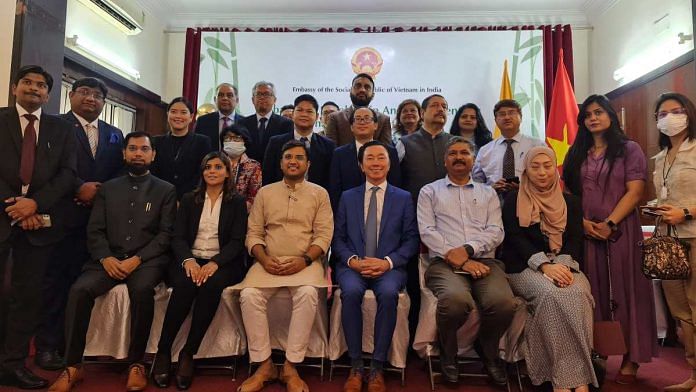New Delhi: Lack of “education enclaves”, long application process, crime and pollution — these are some of the reasons that are limiting India from becoming a favoured education destination for ASEAN students, said representatives of the grouping at an event Wednesday.
ASEAN or the Association of Southeast Asian Nations is a group of 10 southeast Asian nations formed in 1967. The member countries include Vietnam, Indonesia, Malaysia, the Philippines, Singapore and Thailand, and the grouping was formed to promote political and economic cooperation, and regional stability.
“There are several factors that prohibit Vietnamese students from coming to India. The biggest fear in their minds is the issue of safety since rape crimes in the country are often heard of. Other factors are pollution and availability of food. These fears will have to be eliminated from the minds of students to bring them here,” ambassador of Vietnam to India, Pham Sanh Chau, told ThePrint on the sidelines of the event held at the Vietnam embassy.
“Another issue is the long application process of coming to India. Students not only find the process cumbersome, but also are more interested in putting such efforts towards applying in developed countries,” he added.
The envoy said that in order to quell the fears of Vietnamese students, “we are launching the ‘2021 Ambassador’s Undergraduate, Masters and PhD Scholarship'”, which students can avail of from September-October 2021.
He said as of now there are less than 200 Vietnamese students in India. “Their most preferred destinations are the US, Australia, Singapore and the European countries.”
The Indian government has been pushing hard to invite foreign students to the country. In 2018, the government started a ‘Study in India’ programme to “boost the number of inbound international students in India”.
Last year, the government launched a project ‘Destination India’, which seeks to streamline the process of foreign admissions in a bid to project the country as a hub of education.
Every year about 43,000 foreign students come to India seeking higher education, and through this project, the government wants to increase the intake of foreign students to 2 lakh by 2022.
Also read: For new Study in India campaign, govt’s mantra is ‘Focus West Asia’
Other concerns
Speaking at the event, Hanafi, counselor, socio-cultural section of Indonesian embassy, highlighted the issues faced by Indonesian students in India.
“The biggest concern that Indonesian students have is that their Indian degrees will not be recognised in their home country. And though we value the Indian education system, Indian degrees are not valued in all developed countries, which becomes problematic for our students,” he said.
“In addition, parents from Indonesia would feel safer if education enclaves were set up for students to live in. In this way, students can live and study within the enclaves and will be free from other issues of the city like traffic, safety etc.”, he added.
Education enclaves are an enclosed geographical area that houses both hostels and the institutes.
Speaking about the concerns of Laos students, the country’s Third Secretary Khou Zaiyaza said at the event that they “find the application process very difficult”. “It should be made easier in the interest of students.”
Nadia Ahmed Rafie, Brunei’s Third Secretary, said, “It would be of much ease if universities specify their international accreditations.”
Another challenge that all the representatives highlighted at the event was that the Indian government does not reach out to the ASEAN countries in the form of conferences or education fairs like other countries.
India’s fellowship programme
The Modi government had in 2018 announced a programme that was aimed at awarding research fellowships, over a period of three years, to 1,000 ASEAN students to pursue doctoral studies at the 23 Indian Institutes of Technology (IITs).
Under the scheme, 250 students out of the total 1,000 would be getting the fellowship in the first year, 300 students in the second year and 450 students the year after. The government had earmarked Rs 300 crore for the scheme.
However, last year, when the programme was formally rolled out, only 42 ASEAN students were reportedly enrolled in IITs as opposed to the targeted 250.
(Edited by Debalina Dey)
Also read: India’s chance to build presence in the East through ASEAN and Act East




Interesting : India has low brand value, and whatever it had from earlier, is degraded in the Modi years. The rapes, lynchings and vigilante mobs are spin offs of the Modi government. It has created a negative impression on foreign students and tourists. That is bound to be the case.
But we continue with our delusions. The reality is nobody wants to learn from the self certified Vishwa Guru !